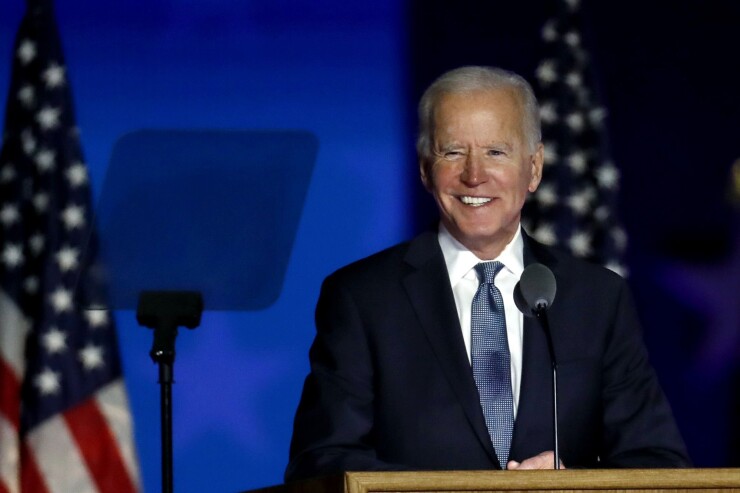
Public finance sector officials are optimistic a Joe Biden presidency will mean strong financial support for state and local governments as well as robust infrastructure legislation.
They also are hopeful the negative impacts of a federal tax overhaul enacted in 2017 will be reversed.
The Associated Press called the presidential race in favor of Biden Saturday based on the vote count in Pennsylvania, where mail-in votes pushed him into a lead projected to be insurmountable. Pennsylvania's 20 electoral votes would be more than enough to push Biden past the 270 electoral votes needed to claim victory.
President Trump, however, has not conceded and his campaign has filed lawsuits in several battleground states contesting the results.
“If Biden is ultimately determined to be president, and even with a Republican Senate, there will be tremendous opportunities for infrastructure, bond, and other legislation and regulatory actions,” said Charles Samuels, of Mintz Levin, counsel to the National Association of Health & Educational Facilities Finance Authorities.
His organization represents includes smaller nonprofit hospitals and colleges that would benefit from proposed legislation to would increase to $30 million from the current $10 million, the limit on small borrowers to use bank-qualified bonds. That provision is part of the House-passed Moving America Forward Act that has been blocked by the Senate.
In the next Congress that takes office Jan. 3, the House bill would need to be reintroduced and most likely modified to include provisions favored by the new administration.
Biden “has a deep understanding of municipal finance and the roles that tax-exempt bonds play to build American infrastructure,” said former President of the U.S. Conference of Mayors Steve Benjamin, who is the mayor of Columbia, S.C., and president of Municipal Bonds for America.
Benjamin dealt with Biden when the former vice president was spearheading the Obama administration’s implementation of the 2009 American Recovery and Reinvestment Act.
“I know from conversations with him and all his senior policy folks that infrastructure is at the very top of his list,” Benjamin said. “We will have the preservation of the tax exemption and a number of creative looks at delivering infrastructure all across the country.”
Pension funds, institutional investors, and sovereign wealth funds are eager to invest in American infrastructure that will create millions of jobs, Benjamin said.
Emily Brock, director of the federal liaison center at the Government Finance Officers Association who founded the Public Finance network as the voice of issuer groups on Washington policy issues, said her organization looks forward to meeting with Biden.
“We’re thrilled to talk with him with our coalition’s efforts to enhance the municipal bond market,” Brock said.
Brock said members are encouraged by Biden’s support of municipal finance in the past, but wary whether Biden will pursue placing a 28% limit on personal tax deductions.
Benjamin said he had discussions with Biden when he was vice president explaining to him the municipal bond industry’s opposition to the 28% limit on deductions.
The Bond Dealers of America was hesitant to discuss a Biden presidency, predicting ongoing litigation will bring uncertainty for weeks.
Mike Nicholas, CEO of BDA, said no matter who is in the White House, he is optimistic for bond initiatives in 2021, including in a future infrastructure bill.
A Biden presidency will make federal infrastructure legislation more doable, said Patrick Luby, senior municipal strategist at CreditSights. The Trump administration also saw infrastructure as a priority, but more in the sense of providing seed money, he said.
“There is a philosophical difference with a Democrat administration that they would be more willing to provide a greater share of federal funding to an infrastructure project,” Luby said.
Biden’s Build Back Better infrastructure plan has many of the same elements of the $1.5 trillion muni-friendly Moving America Forward legislation passed by House Democrats. That House bill includes many municipal bond provisions such as an increase of the limit on small issuer bank-qualified bonds to $30 million and a new program of qualified school infrastructure bonds.
It also includes upgrades to smart roads, water systems, municipal transit networks, schools, airports, rail, ferries, ports, and calls for universal broadband access.





